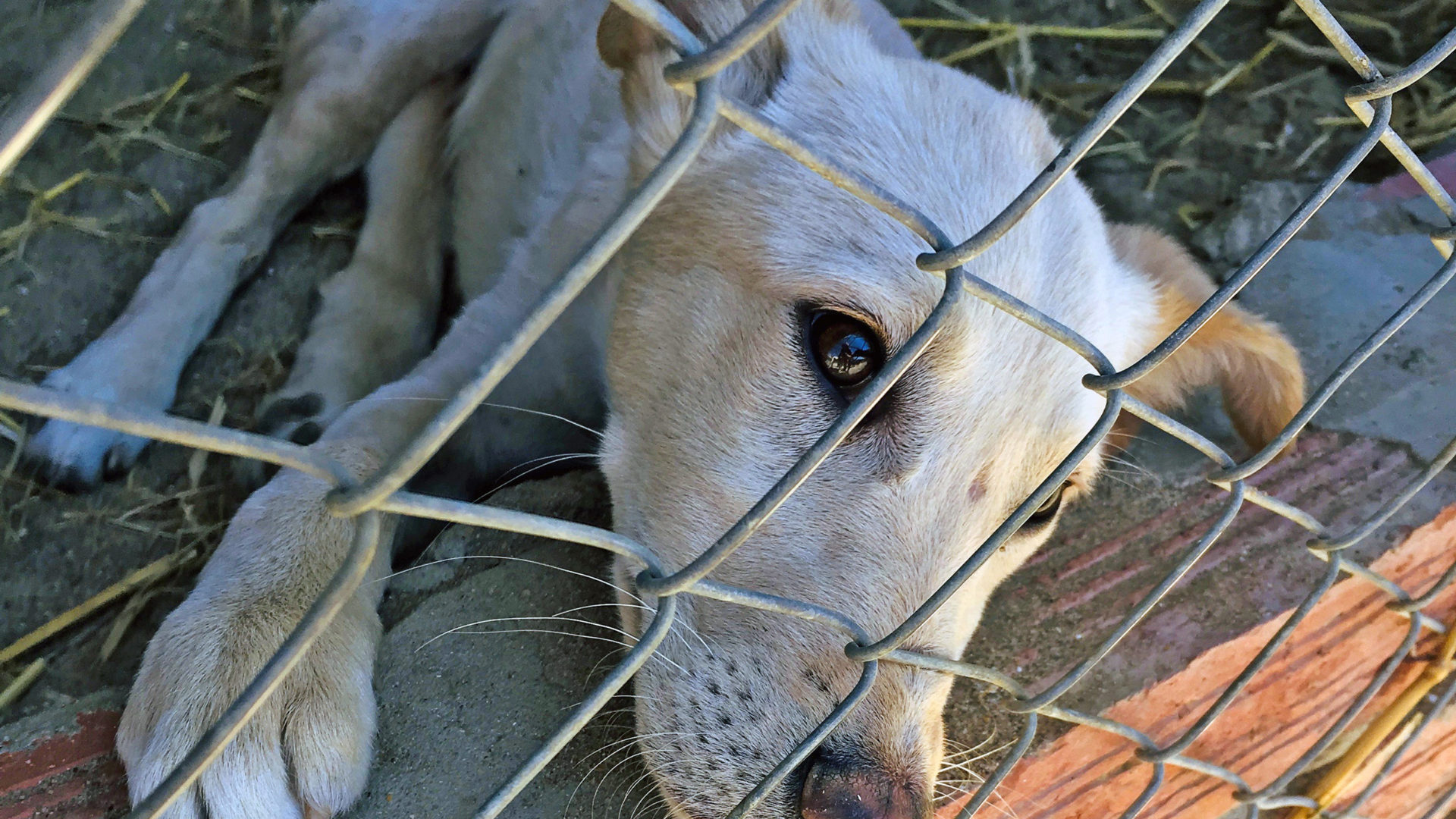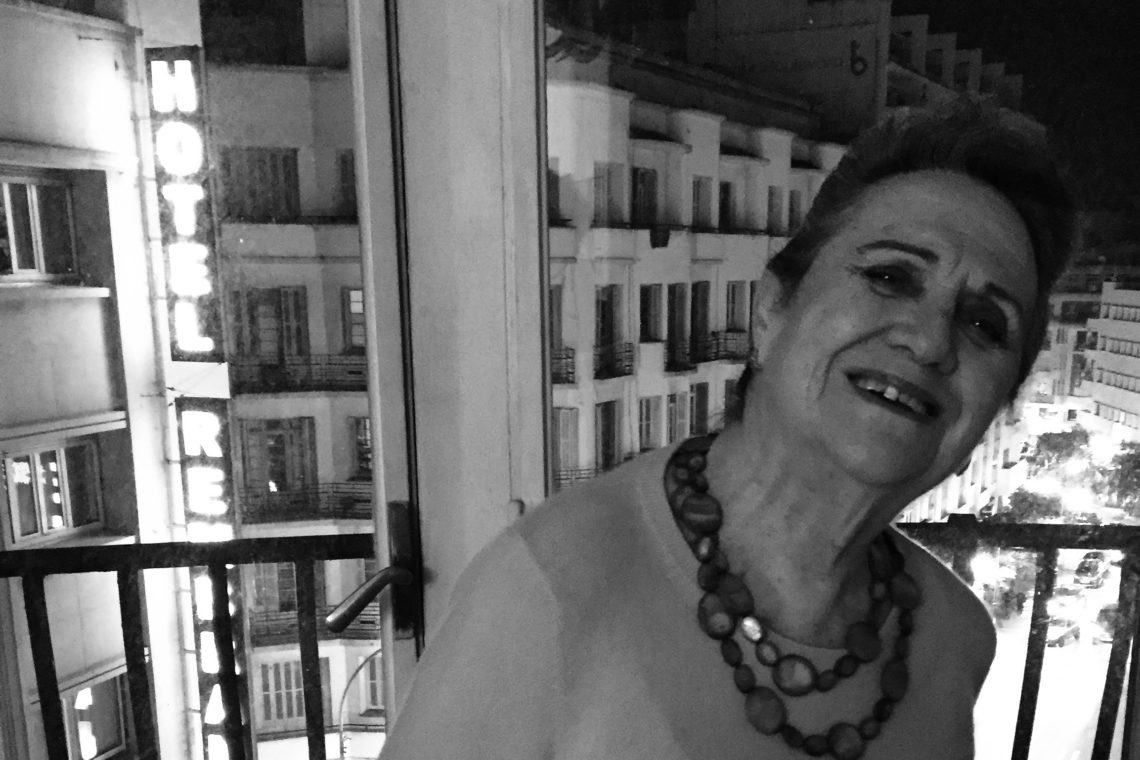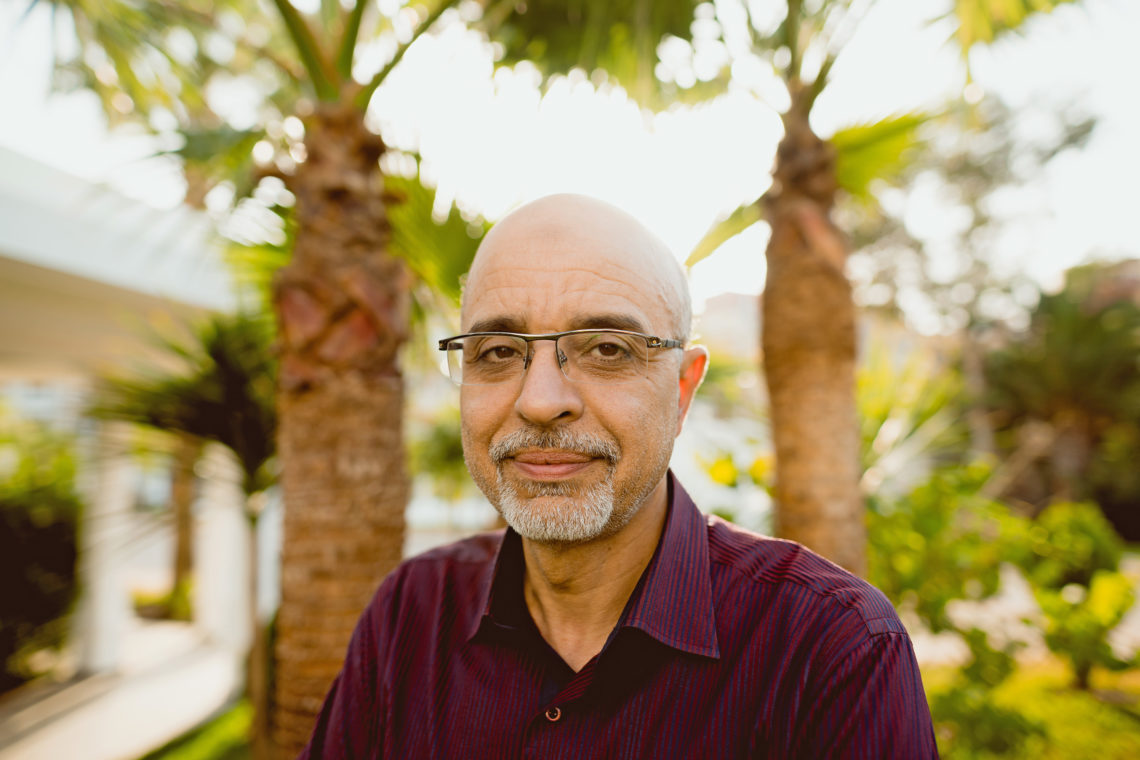“Are we almost there?” I whined to my friend, Mohammed. We’d had been walking the stony streets of Tangier for roughly 15 minutes. I struggled because of the hot weather and my head cold. “We must be close,” I said waving my hand in front my face because of the smell of dog feces. He laughed and motioned towards a sign not too far down the cobblestone sidewalk. My eyes scanned the words CABINET VÉTÉRINAIRE, and I opened the gate and walked into a courtyard littered with cigarette butts and cages.
A short stone path led from the entry gate to an open door. As Mohammed and I shuffled down the path, we passed a man and his dog pacing back and forth on the grass. The dog was a large German shepherd, but his nervous whining and tucked tail made him look curiously small. It was unsettling to see an animal so famous for its strength in such a weak condition.
We entered into a cramped, tiny waiting room with a single office chair. One of the walls was lined with shelves stocked with bags of dry dog and cat food. Crammed amongst all of the supplies was a floor scale, worn down from years of frantic dog scratching. I gingerly sat in the chair and stole a glance through the clinic door. I saw a metal examination table and a counter loaded with cotton swabs, syringes, and a variety of medical instruments. Crile hemostat, carmalt hemostat, thumb forceps, I whispered to myself as I scanned the counter of veterinary tools.
I’d become very familiar with these instruments as a result from volunteering at a shelter in Maine, where I also shadowed the lead veterinarian. Ever since I could remember, I’d dreamed about saving the lives of animals. When I aided dogs and cats as they recovered from their surgeries at my hometown shelter, I would often find myself daydreaming that I was the veterinarian who had performed the surgery, even if it was a just simple spay or neuter. Now I was a mere five years from fulfilling my dream.
“Are you ready?” I heard Mohammed ask. My friend and the vet stood in the doorway awaiting my answer. Being in the presence of the vet, I suddenly understood how the German shepherd felt. I swallowed my fear, nodded, and followed them into the clinic. The vet walked over to a desk a few feet away from the examination table and motioned for Mohammed and me to take a seat on the other side. With all the folders, papers, and prescription pads piled high on the desk, I almost didn’t notice the nameplate: “Dr. Lahrech.”
While the doctor attempted to organize the mess, I thought back to when I first met him four days earlier. For almost a week, together with another student, Laura, I had been taking care of a sick dog we affectionately named Baby Dog. Every night, we’d search the streets for Baby Dog, usually finding him curled up and shivering in a corner. We gave him a blanket, soft food, and water, and with tissues we cleaned the mucous from his eyes and nose.
We knew we needed to bring Baby Dog to a veterinarian, but as students who were only in Morocco for a few months, we didn’t know how to find a clinic. And how were we supposed to transport this dog? Would a vet be willing to treat a stray dog? When Baby Dog stopped accepting food, desperate to save his life, I called Mohammed and asked him to meet Laura and me with the dog. We explained the severity of the situation, and he managed to contact a friend who agreed to drive us to a nearby clinic. Baby Dog could barely walk or stand, and we struggled to lift about 70 pounds of sick dog into the front seat.
The five-minute drive felt like hours. For the entire trip, I watched Laura cradle Baby Dog’s head in her lap. Whether it was due to the illness or the car ride, Baby Dog’s nausea was obvious. Every few minutes Laura would use a tissue to wipe the stream of blood and saliva coming from the poor dog’s mouth. We repeatedly apologized for the bloody mess that created a puddle in the passenger seat, but Mohammed’s friend simply shook his head and smiled, waiving off our comments. He had no problem with the drooling dog. He was just glad to help.
When we arrived at the clinic, Laura carried the limp dog into the facility where we met Dr. Lahrech. Mohammed explained that the dog was a stray we’d been taking care of. I held my breath as I waited for Dr. Lahrech to respond and was relieved when he took Baby Dog in his arms and set him on the examination table. I watched intently as he palpated the stray’s stomach then peered into the eyes, ears, and nose. When he examined inside the throat, Dr. Lahrech’s facial expression changed. He immediately used tongs to pick up a square of gauze and swabbed the back of Baby Dog’s throat. When he pulled his hand back, the once crisp white gauze was soaked in dark red.
My stomach lurched, not because of the sight of blood, but because of what the blood implied. Was the dog on the verge of death? Would Dr. Lahrech use the blood as an excuse to refuse treatment? My fears were quieted when he drew a syringe of oral medication and fed it to Baby Dog followed by two subcutaneous shots to the rear. Baby Dog didn’t even flinch, but I wasn’t sure if that was a good thing or a bad thing. After the ordeal had ended, Dr. Lahrech informed me that our furry friend had contracted bronchopneumonia, so he’d given Baby Dog an anti-inflammatory as well as antibiotics. The fact that Dr. Lahrech had diagnosed and treated a random stray dog without question made we want to speak with him about his experiences as a veterinarian.
Four days later, I sat with Dr. Lahrech and Mohammed, ready for an interview. I started with what I thought was a fairly standard first question, “How long have you been practicing veterinary medicine?” Most health professionals I’ve met have responded to that question immediately, as if they never stopped counting the years. But with Dr. Lahrech, he paused for a moment before pulling out a calculator. “Twenty-seven,” he said. “I’ve been practicing veterinary medicine for 27 years.”
After we all laughed at the absurdity of needing a calculator to answer my question, I moved on to the next question, “When did you first know that you wanted to be a veterinarian?” This time there was no pause, and Dr. Lahrech leaned back in his chair and explained that as a kid he grew up on a farm. He enjoyed spending his childhood surrounded by these animals, and this was when, as a 13-year-old, he discovered his passion for helping them.
“What was your educational experience like?” I asked, shifting the conversation to veterinarian school. Could you describe the schooling you went through to become a vet?”
Dr. Lahrech slowly nodded his head and told me how after high school, he spent seven years studying veterinary medicine, then traveled to Europe for a year for clinicals. As he spoke, he made a fist with one hand, and repeatedly punched the palm of the other, indicating the amount of work and effort it took to get his degree.
“Do you find that you still face challenges at your job today?”
“Every day is a challenge,” he replied.
I had never been so focused as I listened to Dr. Lahrech recount how heart-wrenching and exhausting it is to see animals suffer every day. It was especially difficult for him not to be able to save a sick animal who is so clearly bonded with a human.
His answer segued perfectly with my next question. “Does it matter to you if an animal is owned or a stray?” Before I could finish the question, Dr. Lahrech began shaking his head. He disclosed yet another piece of knowledge he gained in vet school, and that was that all animals, stray or owned, are the same. Not only that, he said, but in Islam, all animals are the same. If a person wants a guaranteed spot in paradise with Allah, he’s got to be kind to animals.
I was not at all surprised by his answer, because I knew about his involvement with the SFT, an animal sanctuary. He treats all animals that are brought to the shelter including dogs, cats, birds, and donkeys. Dr. Lahrech has been named an honorary member of SFT for his role in their TNVT (Treat, Neuter Vaccinate, and Tag) program, a trap and release program that has saved the lives of thousands of dogs in Tangier.
I decided to end the interview on a more personal note. “Do you have any advice for students like me who would also like to study veterinary medicine?”
A look of surprise crossed the vet’s face, and he turned to me and asked in French, Tu veux être une vétérinaire? I shook my head up and down. Mohammed helped to translate to Dr. Lahrech that I was studying animal behavior on a pre-vet track through the University of New England. “I apply to vet school this summer!”
Dr. Lahrech, like the wise mentor he was, advised in a serious tone, “First, you have to love what you do. You have to have the determination to always study. Study, study, study, work, work, work. You have to go into it with your heart.”
Upon hearing this speech, a nearby veterinary technician who had just stepped into the room asked me, “You want to be a veterinarian?” When I said yes, Dr. Lahrech turned to me and said in English You. Are. Crazy!
After closing the interview, we said our goodbyes and he left me with one final remark, “Good luck and may Allah help you.” I actually found his words to be very comforting.
A few days later, I found myself video chatting with my old French teacher and a group of her 7th grade students. “Bonjour Madame! Tu me manques!” I exclaimed, while also waving at my laptop screen in front of me. I was greeted with her familiar smile as she returned the wave with enthusiasm. As she turned her laptop, my screen changed from a familiar face to about 20 or so new ones. The teacher asked me to talk about my experiences in Morocco.
The kids started asking me questions. Many of the questions were pretty basic, quel age as-tu? Tu aimes Maroc? Quel est le temps? It’s been a few years since I’ve taken a French course, but these were simple phrases I knew by heart. To my relief, the students were permitted to ask, in English, the more complex questions, what are your classes like? How do you spend your free time? Why did you choose to study abroad?
My favorite question came from a quiet student in the back of the classroom. “Madame. How do they treat their dogs and cats?”
I smiled at the young animal lover who reminded me of what I was like as a 13-year-old. I recounted the tale of Dr. Lahrech, a superhero who used his magic hands to find out what was hurting Baby Dog. He told them about the series of tricks he’d learned from his mentors, and how after using a mixture of potions and spells, he saved Baby Dog!
I finished the story and noticed that every child’s’ eyes were glued to the screen, wide with awe.
The bell for the next class period rang, and the students began to pack up. The French teacher stepped in front of the screen, “This was fun! I hope you’ll visit us in person in May! Maybe you’ll have some more stories to share!” I thought back to Dr. Larech and thought how if one conversation with him changed my life, maybe a visit from me could change the lives of a group of teenagers. How amazing would it be if I could fill the world with the likes of Dr. Larech.
“Sounds like a plan Madame, I’ll see you in May!”





Comments are moderated by the editor and may not appear on this discussion until they have been reviewed and deemed appropriate for posting. All information collected is handled in a manner consistent with our privacy policy.